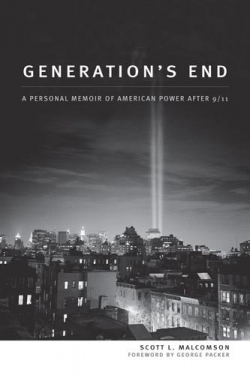Generation's End
A Personal Memoir of American Power After 9/11
On that bright autumn morning in 2001, Scott Malcomson had things going his way. He had a prestigious job as assistant editor of the New York Times’ op-ed section, a successful wife, two young children, and a Brooklyn home with a great view of Manhattan just across the bridge.
Then it all changed.
After dropping his children off at day care, he looked across the river to see that the World Trade Center towers had been replaced by a plume of ash which was quickly covering the entire city.
The next fifty pages of Generation’s End is a riveting, slow-motion, day-by-day, often hour-by-hour, account of the Event-That-Changed-Everything. Seen through his journalist’s gaze, thousands of ash-covered men and women walk across the Brooklyn Bridge in solemn incomprehension. “To say this was an orderly procession is somehow an understatement. It was as though people were commuting away from death,” Malcomson writes. Also present are grief-stricken firemen and a hollow-eyed Red Cross doctor telling people who had lined up to give blood to the wounded to go home, because there weren’t any wounded. Pervading every scene is the smell, always the smell.
As the days after the disaster turn into weeks, Malcomson begins to wonder if anything really has changed. The nation moves through the stages of collective mourning—self-recrimination, anger—in a head-long rush to return to normal. “Normal?” Malcomson writes. “Why the rush? I could not think of a single good reason to return to normal, and there were many good reasons not to.”
Generation’s End is not a polemic, and Malcomson tries to maintain his journalistic balance. But as the reader watches him slowly burn out as an editor, his growing and frustrated desire to be part of the action, rather than to be relegated to checking its grammar, becomes more evident. He is increasingly convinced that the Bush administration’s decision to go it alone in Afghanistan and Iraq is wrong-headed, and decides to take a position with the United Nations High Commission on Human Rights to act on that conviction.
Then, in a twist of fate that would seem contrived in a novel, Malcomson’s boss, mentor, and good friend, Sergio Viera de Mello, is murdered in a truck bomb attack on the United Nations compound in Baghdad. It is a crushing blow to Malcomson and defines his book’s title in deadly eloquence.
The generation that is ending, writes Malcomson, is the generation of US international supremacy. With war still raging in Afghanistan and Iraq in shambles, he makes a convincing, if sobering, case.
Reviewed by
Jack Shakely
Disclosure: This article is not an endorsement, but a review. The publisher of this book provided free copies of the book to have their book reviewed by a professional reviewer. No fee was paid by the publisher for this review. Foreword Reviews only recommends books that we love. Foreword Magazine, Inc. is disclosing this in accordance with the Federal Trade Commission’s 16 CFR, Part 255.

